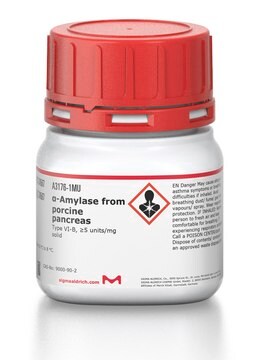P1625
Pancreatin from porcine pancreas
≥3 × USP specifications
Sinonimo/i:
Pancreatin from hog pancreas
About This Item
Prodotti consigliati
Origine biologica
Porcine pancreas
agenzia
USP (specifications)
Forma fisica
powder
Attività specifica
≥3 × USP specifications
Temperatura di conservazione
−20°C
Cerchi prodotti simili? Visita Guida al confronto tra prodotti
Applicazioni
- in a study to assess the treatment of steatorrhea by lipase supplementation therapy
- in a study to investigate treatment options for pancreatic diabetes in patients experiencing the decompensated stage of chronic pancreatitis
- to safely and effectively remove formalin-fixed tissues from arterial grafts without causing structural damage and loss in fiber integrity.
- to assess cleavage by digestive enzymes. It is used for in vitro digestibility analysis and to test the sensitivities of cellulolytic bacteria inhibitors
- along with amyloglucosidase for the in vitro digestion of starch in food samples
Azioni biochim/fisiol
Avvertenze
Danger
Indicazioni di pericolo
Consigli di prudenza
Classi di pericolo
Eye Irrit. 2 - Resp. Sens. 1 - Skin Irrit. 2 - Skin Sens. 1 - STOT SE 3
Organi bersaglio
Respiratory system
Codice della classe di stoccaggio
13 - Non Combustible Solids
Classe di pericolosità dell'acqua (WGK)
WGK 1
Certificati d'analisi (COA)
Cerca il Certificati d'analisi (COA) digitando il numero di lotto/batch corrispondente. I numeri di lotto o di batch sono stampati sull'etichetta dei prodotti dopo la parola ‘Lotto’ o ‘Batch’.
Possiedi già questo prodotto?
I documenti relativi ai prodotti acquistati recentemente sono disponibili nell’Archivio dei documenti.
I clienti hanno visto anche
Il team dei nostri ricercatori vanta grande esperienza in tutte le aree della ricerca quali Life Science, scienza dei materiali, sintesi chimica, cromatografia, discipline analitiche, ecc..
Contatta l'Assistenza Tecnica.










